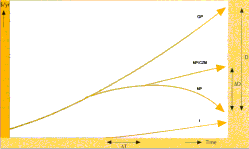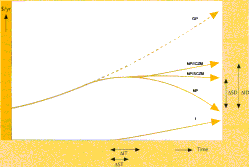Economical Benefits
Apart from the ethical considerations, implementing ICZM
can be shown to have economical advantages also:
- Pro-active planning saves money relative to response
measures, and
- sectoral planning has larger overall costs compared
to integrated planning, if one culminates all costs
involved in the planning of the separate sectors.
With regards to the economical benefits, the use of discount
rate must be mentioned. The use of discount rates
in long term planning means that non-monetary values (e.g.,
number of species, size of a beach) must be converted
to monetary numbers (e.g., 1000 species is worth Euro
1.000.000, 1m2 beach is worth Euro 1000) and assigned
a discount rate to. Such a conversion is very difficult
- if not impossible - to do in an objective way. Moreover,
in IPCC93 it is argued
that the use of high discount rates is, by definition,
incompatible with sustainable development. |
About economical benefits: Illustration
The financial benefits of pro-active and inter-sectoral
investments, compared to business as usual is illustrated
with two graphs.
pro-active
investments:

inter-sectoral
investments:

|